
Welcome Max Young, legal extern
Welcome Max Young to our Team
 We are delighted to introduce Max Young, a third-year student at the University of South Carolina Joseph F. Rice School of Law, who joins us as a legal extern this semester. A Lexington, Kentucky native and Indiana University alum, Max was drawn to South Carolina not only for the warm weather but also for the law school’s growing emphasis on technology and innovation in the legal field, a focus that matches quite well with Kim, Lahey & Killough’s law practice.
We are delighted to introduce Max Young, a third-year student at the University of South Carolina Joseph F. Rice School of Law, who joins us as a legal extern this semester. A Lexington, Kentucky native and Indiana University alum, Max was drawn to South Carolina not only for the warm weather but also for the law school’s growing emphasis on technology and innovation in the legal field, a focus that matches quite well with Kim, Lahey & Killough’s law practice.Max brings hands-on experience from his work as a law clerk at the South Carolina Department of Natural Resources, where he collaborated with the CISO and Assistant General Counsel on information security policies, and as a research assistant focusing on AI policy and its ethical implications under the Model Rules of Professional Conduct. Max is eager to help our team produce practical insights on leveraging AI to enhance legal efficiency while maintaining ethical obligations like client confidentiality.
When he’s not researching data privacy regulations or analyzing AI governance frameworks, you might find Max traveling, hiking, celebrating Indiana University football with friends (what a year to be an IU fan!), or returning to his unique hobby of blacksmithing. We’re excited to have Max’s enthusiasm, technical knowledge, and fresh perspective as part of our firm this semester.

Doug Kim named to South Carolina 50 Most Influential list
Kim Lahey & Killough Firm Founder Doug Kim named to South Carolina 50 Most Influential list
 Kim Lahey & Killough is proud to announce that its firm founder, Doug Kim, has been named to Integrated Media Publishing’s inaugural list of the Statewide 50 Most Influential People in South Carolina. Honorees were chosen through extensive staff research by the publications group as well as community nominations for their work across the Palmetto State.
Kim Lahey & Killough is proud to announce that its firm founder, Doug Kim, has been named to Integrated Media Publishing’s inaugural list of the Statewide 50 Most Influential People in South Carolina. Honorees were chosen through extensive staff research by the publications group as well as community nominations for their work across the Palmetto State.
A former computer programmer and software engineer, intellectual property attorney Doug Kim has assisted in securing some of the earliest blockchain and AI patents in South Carolina. In addition to his own successful law practice, he has built a law firm that has grown to be South Carolina’s go-to boutique firm for intellectual property matters, providing legal solutions and strategies tailored to each client from start-ups to multinational corporations.
Doug is a leader in the state’s technology ecosystem, most recently serving as Chair of South Carolina’s InnoVision Awards. He is a frequent speaker and trusted authority on AI, technology and intellectual property matters throughout the state.
In addition to this recognition, Doug has previously been named to the South Carolina 500 list by SC Biz; the TALK Greenville Top Lawyers list in the area of Technology Virtual; he has been named by Best Lawyers® as Trademark Lawyer of The Year and Patent Lawyer of The Year for the Greenville metro market; Greenville Business Magazine has named him a Legal Elite of the Upstate; South Carolina Super Lawyers® lists him as a Top Rated Intellectual Property Attorney; and Managing Intellectual Property magazine has previously named him as an “IP Star.”
With offices in both Greenville and Charleston South Carolina, the Kim, Lahey & Killough Law Firm provides strategic legal solutions to businesses of all sizes in the areas of intellectual property creation and protection, brand protection, invention protection, copyright, licensing, intellectual property litigation, trade secrets, software protection, internet and e-commerce issues, corporate formation, contracts, and business disputes and mediation resolutions.
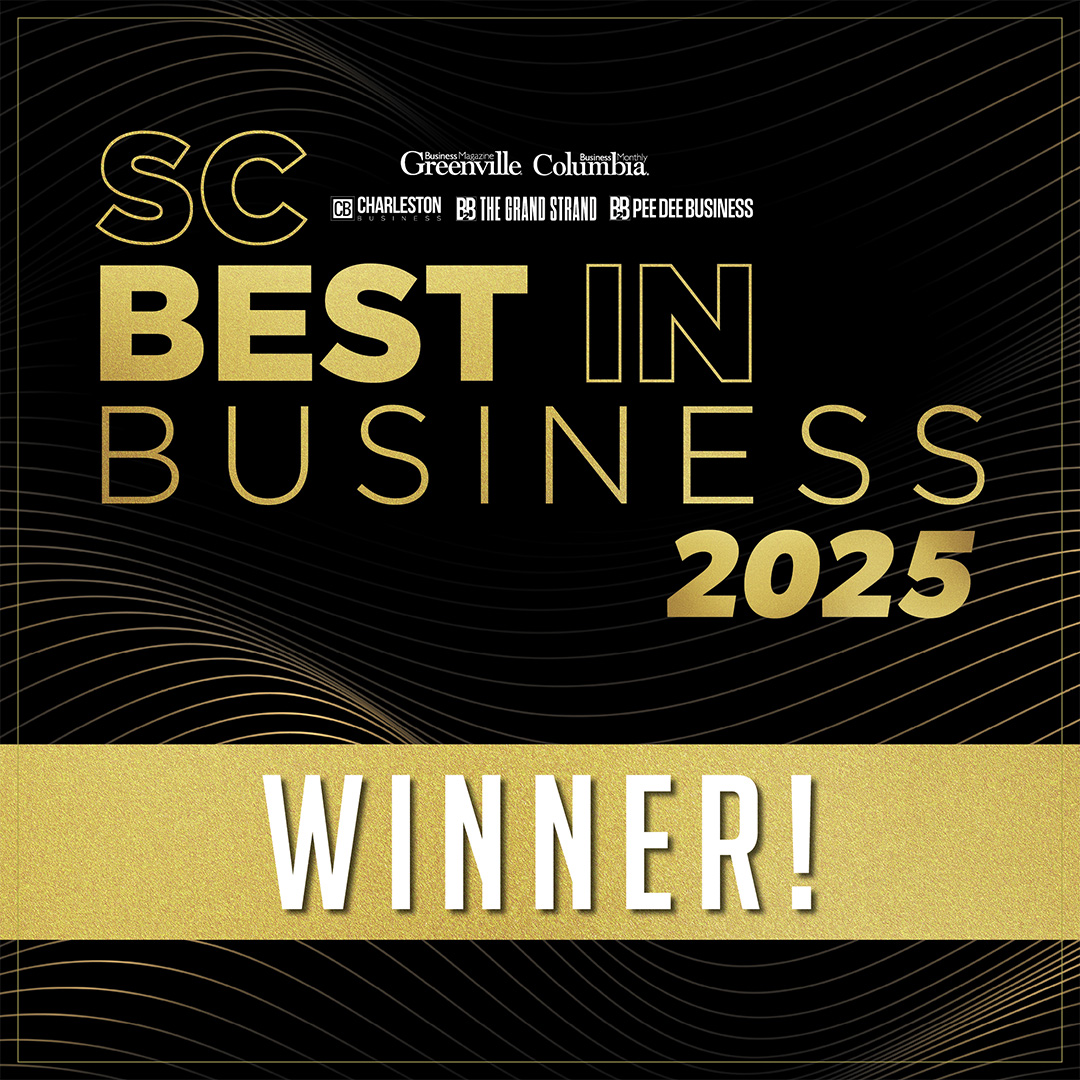
Kim Lahey Killough named Best Intellectual Property Law Firm in South Carolina
 Kim, Lahey & Killough Law Firm is proud to announce that we have been named the Best Intellectual Property Law Firm in South Carolina by Greenville Business Magazine, Columbia Business Monthly, Charleston Business Magazine, B2B: The Grand Strand and B2B: Pee Dee Business as part of their Best in Business 2025 initiative. This peer and public voting award was announced in the December 2025 issues of the publications.
Kim, Lahey & Killough Law Firm is proud to announce that we have been named the Best Intellectual Property Law Firm in South Carolina by Greenville Business Magazine, Columbia Business Monthly, Charleston Business Magazine, B2B: The Grand Strand and B2B: Pee Dee Business as part of their Best in Business 2025 initiative. This peer and public voting award was announced in the December 2025 issues of the publications.
The firm adds this award to many bestowed in 2025, including:
Kim Lahey Killough named to Best Law Firms
Kim Lahey Killough intellectual property and business attorneys named in Best Lawyers
Kim Lahey Killough attorneys named in South Carolina Super Lawyers
Kim Lahey Killough attorneys named Legal Elite by Charleston Business Magazine and Greenville Business Magazine
Firm Attorneys named in Greenville Top Lawyers by TALK Greenville
We are thankful for the trust and endorsements of our clients, peers, and associates.
With offices in both Greenville and Charleston South Carolina, Kim, Lahey & Killough Law Firm is devoted to helping clients establish, enforce, and leverage their intellectual property rights from the Upstate to the Lowcountry to across the globe. The firm serves the manufacturing, software, energy, finance, hospitality, tourism, defense, agriculture and technology industries as well as universities. Key practice areas include intellectual property, corporate and business matters including formation and structure, mergers and acquisitions, contracts, cybersecurity, franchising, business, commercial and intellectual property litigation, and mediation.

Kim Lahey Killough Listed in 2026 Best Law Firms
Kim, Lahey & Killough Listed in 2026 Best Law Firms
The Kim, Lahey & Killough Law Firm is pleased to be named in the 2026 edition of Best Law Firms® for the Greenville and Charleston, South Carolina markets.
The firm is recognized for its work in the following areas:
Charleston, South Carolina office
- Litigation – Intellectual Property
- Trademark Law
- Business Organizations (including LLCs and Partnerships)
- Corporate Law
Greenville, South Carolina office
- Litigation – Intellectual Property
- Trademark Law
- Copyright Law
- Litigation – Patent
- Commercial Litigation
- Patent Law
With offices in both Greenville and Charleston, SC, Kim, Lahey & Killough Law Firm is devoted to helping clients establish, enforce, and leverage their intellectual property rights from the Upstate to the Lowcountry to across the globe. The firm serves the manufacturing, software, energy, finance, hospitality, tourism, defense, agriculture and technology industries as well as universities. Key practice areas include intellectual property, corporate and business matters including formation and structure, mergers and acquisitions, contracts, cybersecurity, franchising, business, commercial and intellectual property litigation, and mediation.
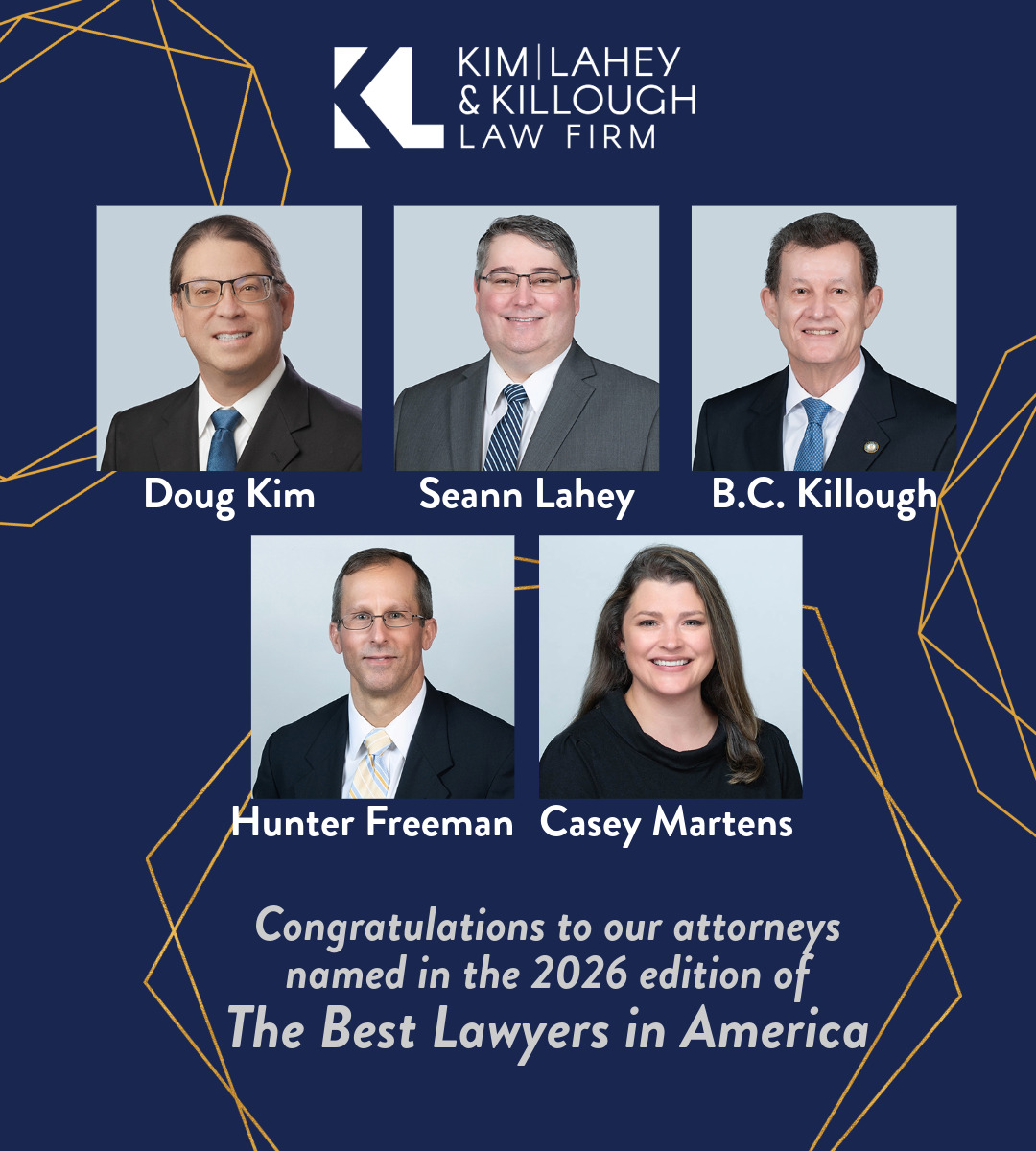
Kim, Lahey Killough attorneys listed 2026 Best Lawyers
Kim, Lahey & Killough attorneys listed in 2026 Best Lawyers
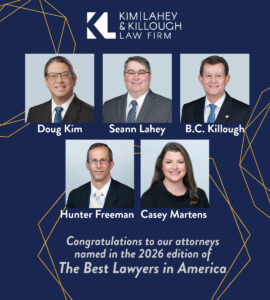 Kim, Lahey & Killough Law Firm is honored to announce that five of the firm attorneys are listed in The Best Lawyers in America® 2026 edition:
Kim, Lahey & Killough Law Firm is honored to announce that five of the firm attorneys are listed in The Best Lawyers in America® 2026 edition:
In the firm’s Greenville home office, firm founder Douglas W. Kim is recognized for his work in
- Litigation – Intellectual Property
- Litigation – Patent
- Patent Law (Lawyer of the Year, 2019)
- Trade Secrets Law
- Trademark Law (Lawyer of the Year, 2022)
Firm co-founder, Seann Lahey is listed for his work in:
- Patent Law
- Trademark Law
And Greenville patent attorney Hunter S. Freeman is commended for his work in:
- Commercial Litigation
- Copyright Law
- Litigation – Intellectual Property
- Litigation – Patent
- Trademark Law
In the firm’s Charleston office, Charleston patent attorney B. C. Killough celebrates his 15th year on the Best Lawyers list for his work in:
- Business Organizations (including LLCs and Partnerships)
- Corporate Law (Lawyer of the Year, 2015)
- Litigation – Intellectual Property
- Patent Law
- Trademark Law
Licensed in South Carolina, North Carolina and Georgia, Casey Martens heads up the firm’s Brevard, NC office. She is recognized by Best Lawyers in the Greenville, SC metro as a 2026 Best Lawyers One to Watch in America in the areas of:
- Employee Benefits Law
- Intellectual Property Law
- Labor and Employment Law – Employee
- Labor and Employment Law – Management
- Litigation – Labor and Employment
Since 1981, The Best Lawyers in America® and Best Lawyers: Ones to Watch® in America has compiled and reviewed peer evaluations from across the United States to identify an annual list of honorees. This year, over 31 million evaluations were analyzed, including a record-breaking 4.8 million new responses.
About Kim, Lahey & Killough
With offices in Greenville and Charleston, SC and Brevard, NC, the Kim, Lahey & Killough Law Firm is devoted to helping clients establish, enforce, and leverage their intellectual property rights from the Upstate, to the Lowcountry to across the globe.

All attorneys listed as 2025 Legal Elite
Entire Kim, Lahey & Killough attorney team listed as 2025 Legal Elite by Charleston Business and Greenville Business Magazines
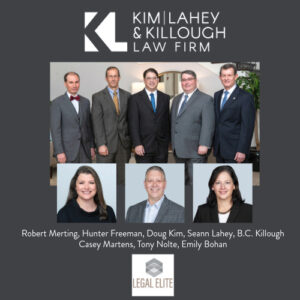 Kim, Lahey & Killough is proud to announce that each of their eight attorneys has been named in the 2025 Legal Elite lists with all five of the firm’s registered patent attorneys recognized as Legal Elite in Intellectual Property and Innovation by Greenville Business Magazine and Charleston Business Magazines. “There are only a select few firms in South Carolina that are boutique intellectual property firms and to have our entire team recognized by our peers in Legal Elite is quite an honor. This recognition confirms the commitment we have to our clients and to providing excellent legal services that help our clients create and protect their intellectual property. This reaffirms our continuing commitment to our clients to assist them with matching legal strategies with their business goals to grow their companies and innovations,” commented firm founder, Doug Kim.
Kim, Lahey & Killough is proud to announce that each of their eight attorneys has been named in the 2025 Legal Elite lists with all five of the firm’s registered patent attorneys recognized as Legal Elite in Intellectual Property and Innovation by Greenville Business Magazine and Charleston Business Magazines. “There are only a select few firms in South Carolina that are boutique intellectual property firms and to have our entire team recognized by our peers in Legal Elite is quite an honor. This recognition confirms the commitment we have to our clients and to providing excellent legal services that help our clients create and protect their intellectual property. This reaffirms our continuing commitment to our clients to assist them with matching legal strategies with their business goals to grow their companies and innovations,” commented firm founder, Doug Kim.
The IP attorneys named Legal Elite include firm founders Doug Kim and Seann Lahey as well as B.C. Killough, Hunter Freeman, and Robert Merting.
In addition to the firm’s core intellectual property practice, the firm supports businesses with corporate counsel. Business attorneys Casey Martens, Anthony Nolte and Emily Bohan were each recognized for their work in corporate matters: Casey was named for her work in Employment Law – Defendants and Emily Bohan was listed for Corporate Law – Business Organization matters.
Greenville business attorney Anthony Nolte rounds out Kim, Lahey & Killough’s whole team of Legal Elite, named for his work in Corporate Law-Merger & Acquisitions. Licensed in both South Carolina and Texas, Tony is a former business and financial executive as well as in-house counsel for Shell, among other successful ventures. He concentrates his legal work in the areas of company structure and formation, start-ups, early-stage and growth companies, corporate governance, mergers, divestitures, and acquisitions, financings, franchising & licensing, contracts, business succession, business disputes & resolutions. Outside of the office, Tony Nolte is an Angel Investor, teaches as an adjunct professor at Furman University, mentors startups in the Greenville ecosystem, serves as a limited partner in the Greenville Next Founders Fund I and is a member of VentureSouth.
The Legal Elite are selected annually through peer nominations from attorneys throughout the state of South Carolina in 50 legal practice areas.
About Kim, Lahey & Killough
With offices in Greenville and Charleston, SC and Brevard, NC, the Kim, Lahey & Killough Law Firm is devoted to helping clients establish, enforce, and leverage their intellectual property rights from the Upstate, to the Lowcountry to across the globe.

Seann Lahey named to GSSM Board
Kim, Lahey & Killough congratulates Greenville registered patent attorney and firm founder Seann Lahey, who has been elected to the South Carolina Governor’s School for Science & Mathematics (GSSM) Foundation board of directors for 2025-2026.
 Seann Lahey is known for his work in STEM fields as an intellectual property attorney. He has extensive experience dealing with international and U.S. patent prosecution, trademarks, copyrights, trade secrets, licensing of intellectual property rights, and rendering legal opinions on validity, infringement and enforceability of intellectual property rights, as well as IP litigation.
Seann Lahey is known for his work in STEM fields as an intellectual property attorney. He has extensive experience dealing with international and U.S. patent prosecution, trademarks, copyrights, trade secrets, licensing of intellectual property rights, and rendering legal opinions on validity, infringement and enforceability of intellectual property rights, as well as IP litigation.
What’s more, Seann is a parent of a recent alum of the GSSM, affording him the ability to advocate for the school from multiple perspectives. “I’m deeply honored to join the Foundation Board of Directors for GSSM,” he commented. “As a parent of a GSSM alum, I can attest to the incredible work and dedication of everyone involved with the school. I look forward to contributing to our shared mission of fostering academic excellence and supporting the brilliant minds of tomorrow.”
Beth Dinndorf, executive director of the GSSM Foundation, added, “We are grateful to the new directors, the new board officers, and all members of the GSSM Foundation Board of Directors for their leadership and commitment to the mission of GSSM and the students it serves. Their collective talents and contributions help GSSM remain the top-ranked public high school in South Carolina, providing an exceptional STEM education to more than 10,000 students in grades 3 through 12 each year.”
About Kim, Lahey & Killough
With offices in Greenville and Charleston, SC and Brevard, NC, the Kim, Lahey & Killough Law Firm is devoted to helping clients establish, enforce, and leverage their intellectual property rights from the Upstate, to the Lowcountry to across the globe. For more information, visit the firm website at kimandlahey.com .
About the South Carolina Governor’s School for Science & Mathematics
 The South Carolina Governor’s School for Science & Mathematics (GSSM) is a nationally ranked top 10 public high school that exists to bring world-class STEM education to students across the state. Founded in 1988 by Gov. Carroll Campbell, GSSM is a state resource that offers a variety of programs including an intensive two-year residential high school, a challenging virtual engineering program, summer camps, and in-school experiences for students in 3rd through 12th grades. The GSSM Foundation advocates for GSSM and provides funds and support to enhance its programs and students’ educational endeavors. Learn more at www.scgssm.org. Read GSSM’s press release announcing the 2025-2026 Board here.
The South Carolina Governor’s School for Science & Mathematics (GSSM) is a nationally ranked top 10 public high school that exists to bring world-class STEM education to students across the state. Founded in 1988 by Gov. Carroll Campbell, GSSM is a state resource that offers a variety of programs including an intensive two-year residential high school, a challenging virtual engineering program, summer camps, and in-school experiences for students in 3rd through 12th grades. The GSSM Foundation advocates for GSSM and provides funds and support to enhance its programs and students’ educational endeavors. Learn more at www.scgssm.org. Read GSSM’s press release announcing the 2025-2026 Board here.

Five attorneys named to 2025 Super Lawyers
Five Kim, Lahey & Killough attorneys named in 2025 South Carolina Super Lawyers
 Kim, Lahey & Killough is pleased to announce that five of its attorneys have been recognized in the 2025 edition of South Carolina Super Lawyers, a legal ranking published by Thomson Reuters.
Kim, Lahey & Killough is pleased to announce that five of its attorneys have been recognized in the 2025 edition of South Carolina Super Lawyers, a legal ranking published by Thomson Reuters.
Four patent attorneys with Kim, Lahey & Killough – Doug Kim, Seann Lahey, B.C. Killough and Hunter Freeman – were named among the state’s top-rated intellectual property attorneys. “I am honored to share this recognition with my law partners and am proud that these honors recognize not only individual achievement, but also the depth and strength of our intellectual property team in South Carolina,” commented founding attorney Doug Kim.
Casey Martens has been named in the 2025 South Carolina Rising Stars list as a top-rated employment and labor attorney in the Greenville market – her fifth year earning this recognition.
Super Lawyers recognizes no more than five percent of the lawyers statewide each year, and Rising Stars honors only 2.5 percent of the lawyers in the state. Both lists are compiled by Thomson Reuters, a rating service of outstanding lawyers from more than 70 practice areas who have attained a high degree of peer recognition and professional achievement.
About Kim, Lahey & Killough
With offices in Greenville and Charleston, SC and Brevard, NC, the Kim, Lahey & Killough Law Firm is devoted to helping clients establish, enforce, and leverage their intellectual property rights from the Upstate, to the Lowcountry to across the globe.
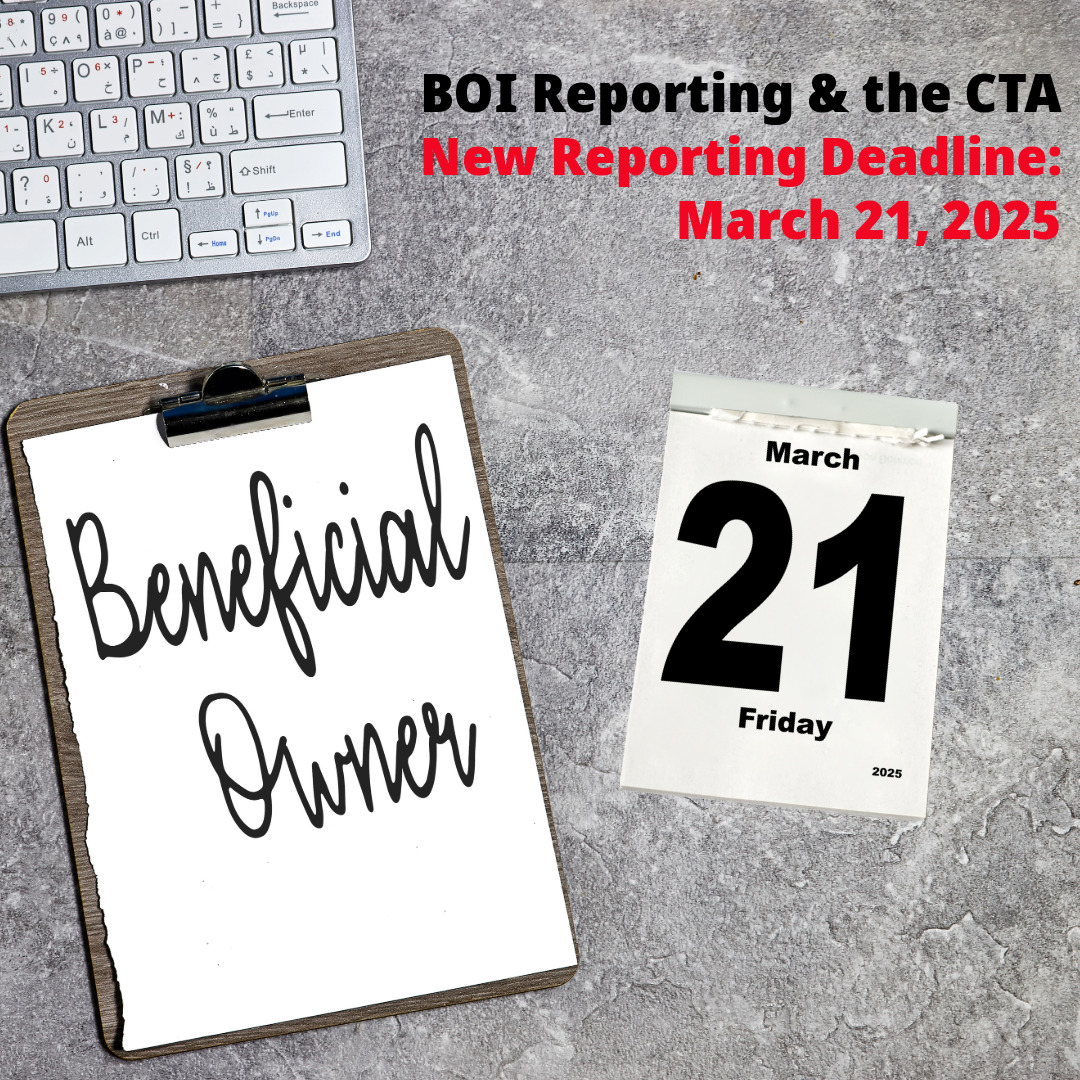
BOIR CTA new reporting deadline
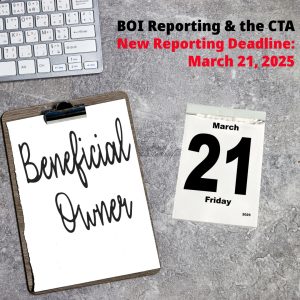 February 28, 2025
February 28, 2025
If you have been tracking the movement of the Beneficial Ownership Information Reporting and Corporate Transparency Act as it makes its way through our Federal Court system you will not be surprised to learn that yet another ruling has been released on this matter today.
How does today’s ruling affect you?
The short answer is that your company(ies) DO need to file a BOIR to be compliant with the CTA unless they qualify under one of the exceptions under the law. Currently, the injunction against the CTA is not in effect until the Court of Appeals issues an opinion.
In the meantime, FinCEN extended the BOIR filing deadline to March 21st. This update indicates that while a new deadline has been issued, fines or penalties will not be imposed nor will enforcement actions be taken against any companies based on a failure to file a BOIR until they publish an interim rule. That new rule is expected to be issued on or before March 21st.
While there’s still some uncertainty surrounding this Act, failure to comply could create significant risk to your business (penalties for non-compliance are steep at $500 per day per beneficial owner and possible jail time.)
Even though you may have heard that you did not need to file a BOIR during one of the “off again” moments, we are advising our clients to comply with the Act. If you would like assistance with filing your BOIR or other business and corporate related matters, please contact your attorney or Kim, Lahey & Killough attorney Emily Bohan or Tony Nolte.
Please note that Kim, Lahey & Killough will not file a BOI report for you, nor arrange to have a BOI report filed for you unless you reach out to us directly to request assistance.
For more information, please visit https://kimandlahey.com/practice-areas/corporate-transparency-act/

Key Business and Legal Trends in 2025
Navigating the Legal Landscape: Key Trends for Businesses in 2025
 Kim, Lahey & Killough founding attorney Doug Kim joined Mike Switzer on South Carolina Public Radio’s South Carolina Business Review to discuss the new legal landscape for businesses in 2025. Key points include:
Kim, Lahey & Killough founding attorney Doug Kim joined Mike Switzer on South Carolina Public Radio’s South Carolina Business Review to discuss the new legal landscape for businesses in 2025. Key points include:
Disruptive Technology’s Impact
AI is rapidly reshaping business and the legal profession, presenting both opportunities and challenges. Unlike previous technological shifts, AI is accelerating change at an exponential rate, forcing businesses and law firms to adapt faster than before.
Key Implications for Businesses
-
Technology Adoption: Companies must be prepared to leverage new technologies quickly and strategically.
-
Increased M&A Activity: With substantial cash reserves and a pro-business climate, mergers and acquisitions are expected to increase.
-
Due Diligence Preparedness: Doug strongly advises businesses to begin due diligence preparations in anticipation of potential acquisitions.
In addition, the legal profession itself is experiencing significant disruption. AI tools are enhancing efficiency in research, particularly with regard to patent and trademark searches. Kim emphasizes that AI won’t replace lawyers, but lawyers and law firms that adopt AI technologies will likely outperform those that resist change.
In 2025, businesses must stay agile, embrace technology, and quickly manage the risks associated with new technologies and business models.
Listen to the full interview here or read the full transcript, below.

Full Transcript of The new legal landscape for businesses, an interview with Doug Kim on Mike Switzer’s South Carolina Business Review.
Broadcast on South Carolina Public Radio on January 23, 2025
[00:09.710] – Mike Switzer
Hello and welcome to the South Carolina Business Review. This is Mike Switzer.
As this New Year with a new administration in Washington just getting started, many businesses may be looking at the legal landscape and what they can expect to see in 2025. Doug Kim is an attorney in Greenville, South Carolina, where he joins us from now by phone to help us with this topic.
Doug, welcome to the program.
[00:39.990] – Doug Kim
How are you doing? Thanks for having me.
[00:41.620] – Mike Switzer
Great. Let’s just go ahead and kick off the discussion with an overview of what you see happening in the legal world this year.
[00:49.970] – Doug Kim
Well, it’s going to be quite a few fast changes, and I’ll give you my opinion of the analogies of why I think this is going to happen. And that is, Windows came out many years ago, and it made software accessible to the public in general, which was disruptive for society and business. 2007, the iPhone comes out and it creates software in your hand, again, disruptive for the benefit of increased technology – massive changes in business and society. What’s happening now is we have AI, which is even faster, that’s doing a couple of things. This is what’s driving changes in the legal side, I think. Ai has made everybody feel like, Oh, there’s this new technology. Gosh, we’re behind. We need to be stepping up. That’s one piece. Another piece is you’ve got a new administration who, by all accounts, seems to be reducing regulations and is going to be pro-business. Not that other administrations haven’t been, but this particular one seems to be more pro-business. Add on top of that, you’ve got a bunch of pent-up demand: during election years, businesses tend to, I don’t want to say stall, but they tend to not make much major decisions until they see what’s going on.
There’s a lot of money sitting on the guidelines to move projects forward. So, with all that said, you add the technology changes, the environmental changes, the geopolitical changes, and the fact there’s a lot of cash sitting out there, you’re going to watch the legal profession really have a lot of, quote, “pressures on it.” Our clients are going to be pressing us to be able to adopt technology and candidly, probably move faster than the legal profession is used to.
[02:22.290] – Mike Switzer
Okay. It sounds to me like a massive headache year for you.
[02:25.480] – Doug Kim
It could be based on the law firm’s attitude. It’s not uncommon for technology to change the law. For example, in one area of the law, the right to privacy. Well, everybody’s got a phone in their pocket now, and that phone has a camera. What is your expectation of privacy if everybody can video and photograph you now? So the way the law changed was because the technology changes. The law firms are just going to have to say, “All right, I need to understand this.” I need to step up and say, Here the deal is, as well as how these businesses are adopting it and say, “Okay, how do I manage the risk?”, which is a lot of what lawyers do with these new technologies and these new ways of doing business. And how do I keep myself up to speed so I can respond properly and competently to my client’s demands? I think when you say it could be a lot of headaches, it’s going to require lawyers to educate themselves in areas faster than maybe they’re accustomed.
[03:18.490] – Mike Switzer
Maybe giving up some of the bread and butter business that’s been the thing. In any way, you see a lot of consumers and businesses turning to alternative legal service providers like Legal Zoom.
[03:32.980] – Doug Kim
That’s exactly right. There is definitely a place for that. The legal services traditionally required a lawyer and a lawyer thinking to do some of this stuff. With the advent of some of these other businesses being in those areas, particularly with the leveraging of technology, it may not be a lawyer’s job, either 100% or maybe not even at all. I’ll give you a good example. The type of work that I principally do is intellectual property. We used to have to go hire people to do patent searches and trademark searches for us. Over the years, these patent and trademark databases have been developed by government agencies, Google patents, things like that. You can take the current technology with AI and do a patent or trademark search much more efficiently and faster than a human being could have done it years ago. Some of those tools that are out there are going to reduce, I don’t think eliminate…but reduce the need for some of the legal services that typically an attorney would do. Ai is not going to replace lawyers. It’s not going to do that. However, the law firms that adopt AI will probably replace the ones that don’t.
[04:35.080] – Mike Switzer
What is your recommendation for businesses that are listening right now then on what they should be doing to take advantage of these trends?
[04:41.730] – Doug Kim
If I had to say it in one sentence: Start thinking about getting ready for due diligence. You can Google due diligence and see what that takes. I mean, anybody can do that. If I’m right and there’s going to be an increased M&A activity and companies are going to be acquiring technology, not developing it, a company that wants to be a target for an acquisition would serve themselves well getting ready for this process.
[05:05.080] – Mike Switzer
All right, Doug. Great information. Thank you so much for spending time with us today.
[05:09.120] – Doug Kim
Happy to do it. Enjoyed it.
[05:10.870] – Mike Switzer
Doug Kim is an attorney. He joined us by phone from his office in Greenville, South Carolina. Remember, you can hear this show again at our web page, southcarolinapublicradio dot org. You can hear us again wherever you find podcasts with the South Carolina Business Review. This is Mike Switzer.
[05:33.700] – Announcer
The views expressed on the South Carolina Business Review do not necessarily reflect those of South Carolina Public Radio.

